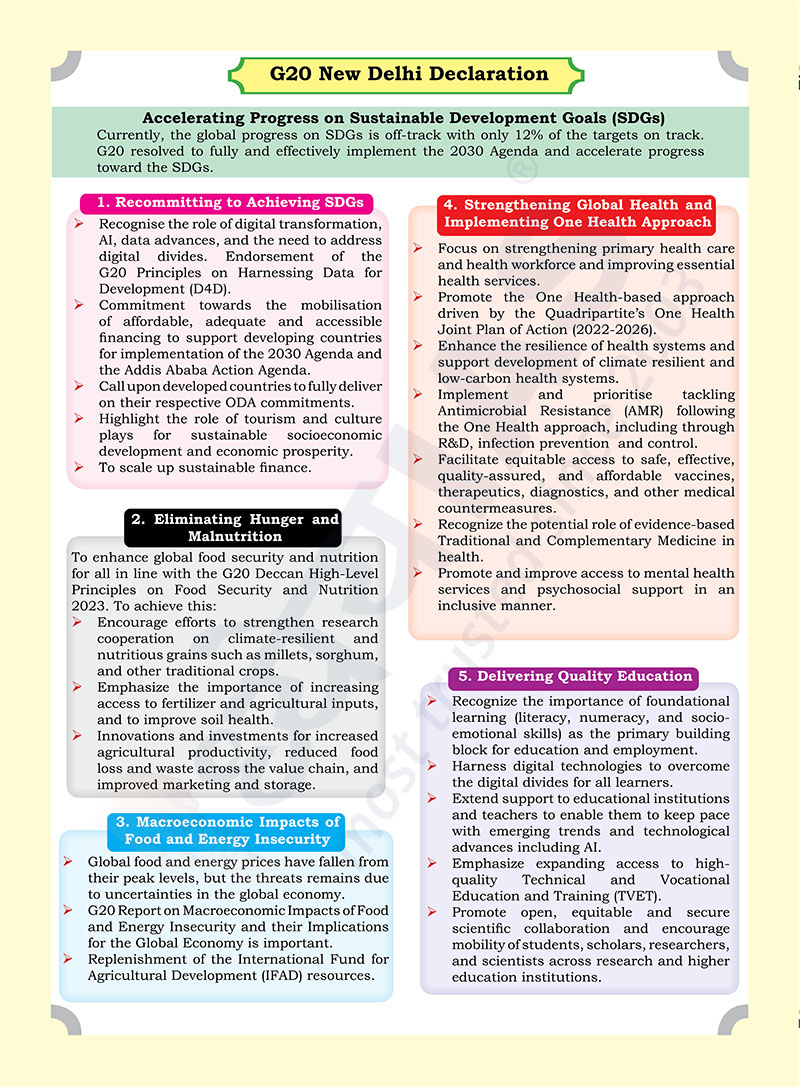Currently, the global progress on SDGs is off-track with only 12% of the targets on track. G20 resolved to fully and effectively implement the 2030 Agenda and accelerate progress toward the SDGs.
1. Recommitting to Achieving SDGs
- Recognise the role of digital transformation, AI, data advances, and the need to address digital divides. Endorsement of the G20 Principles on Harnessing Data for Development (D4D).
- Commitment towards the mobilisation of affordable, adequate and accessible financing to support developing countries for implementation of the 2030 Agenda and the Addis Ababa Action Agenda.
- Call upon developed countries to fully deliver on their respective ODA commitments.
- Highlight the role of tourism and culture plays for sustainable socioeconomic development and economic prosperity.
- To scale up sustainable finance.
2. Eliminating Hunger and Malnutrition
To enhance global food security and nutrition for all in line with the G20 Deccan High-Level Principles on Food Security and Nutrition 2023. To achieve this:
- Encourage efforts to strengthen research cooperation on climate-resilient and nutritious grains such as millets, sorghum, and other traditional crops.
- Emphasize the importance of increasing access to fertilizer and agricultural inputs, and to improve soil health.
- Innovations and investments for increased agricultural productivity, reduced food loss and waste across the value chain, and improved marketing and storage.
3. Macroeconomic Impacts of Food and Energy Insecurity
- Global food and energy prices have fallen from their peak levels, but the threats remains due to uncertainties in the global economy.
- G20 Report on Macroeconomic Impacts of Food and Energy Insecurity and their Implications for the Global Economy is important.
- Replenishment of the International Fund for Agricultural Development (IFAD) resources.
4. Strengthening Global Health and Implementing One Health Approach
- Focus on strengthening primary health care and health workforce and improving essential health services.
- Promote the One Health-based approach driven by the Quadripartite’s One Health Joint Plan of Action (2022-2026).
- Enhance the resilience of health systems and support development of climate resilient and low-carbon health systems.
- Implement and prioritise tackling Antimicrobial Resistance (AMR) following the One Health approach, including through R&D, infection prevention and control.
- Facilitate equitable access to safe, effective, quality-assured, and affordable vaccines, therapeutics, diagnostics, and other medical countermeasures.
- Recognize the potential role of evidence-based Traditional and Complementary Medicine in health.
- Promote and improve access to mental health services and psychosocial support in an inclusive manner.
5. Delivering Quality Education
- Recognize the importance of foundational learning (literacy, numeracy, and socioemotional skills) as the primary building block for education and employment.
- Harness digital technologies to overcome the digital divides for all learners.
- Extend support to educational institutions and teachers to enable them to keep pace with emerging trends and technological advances including AI.
- Emphasize expanding access to highquality Technical and Vocational Education and Training (TVET).
- Promote open, equitable and secure scientific collaboration and encourage mobility of students, scholars, researchers, and scientists across research and higher education institutions.







